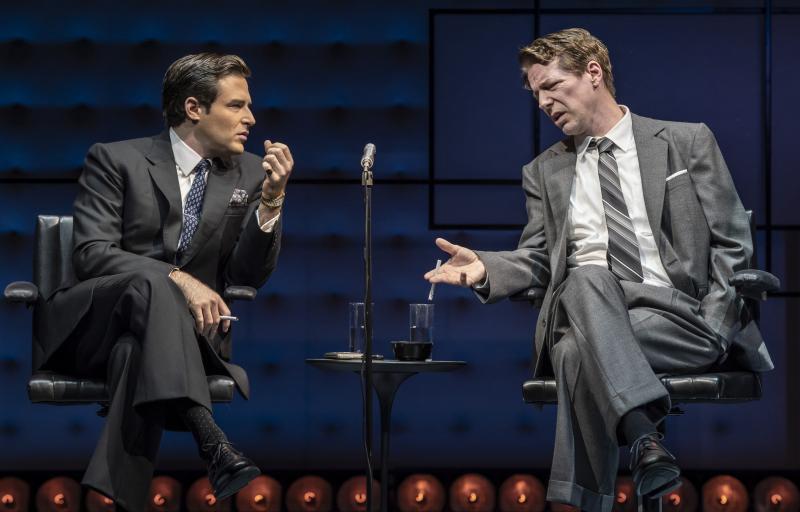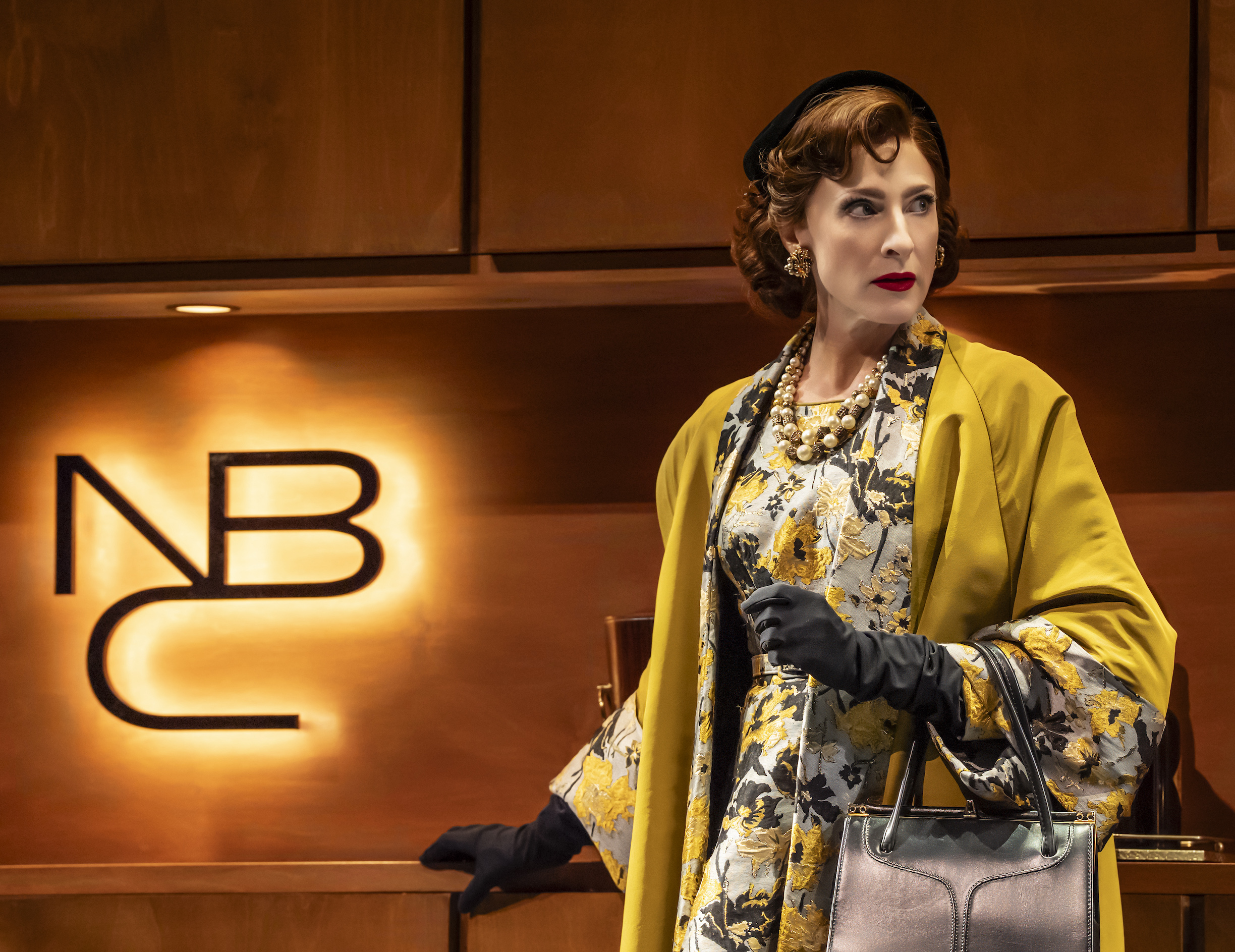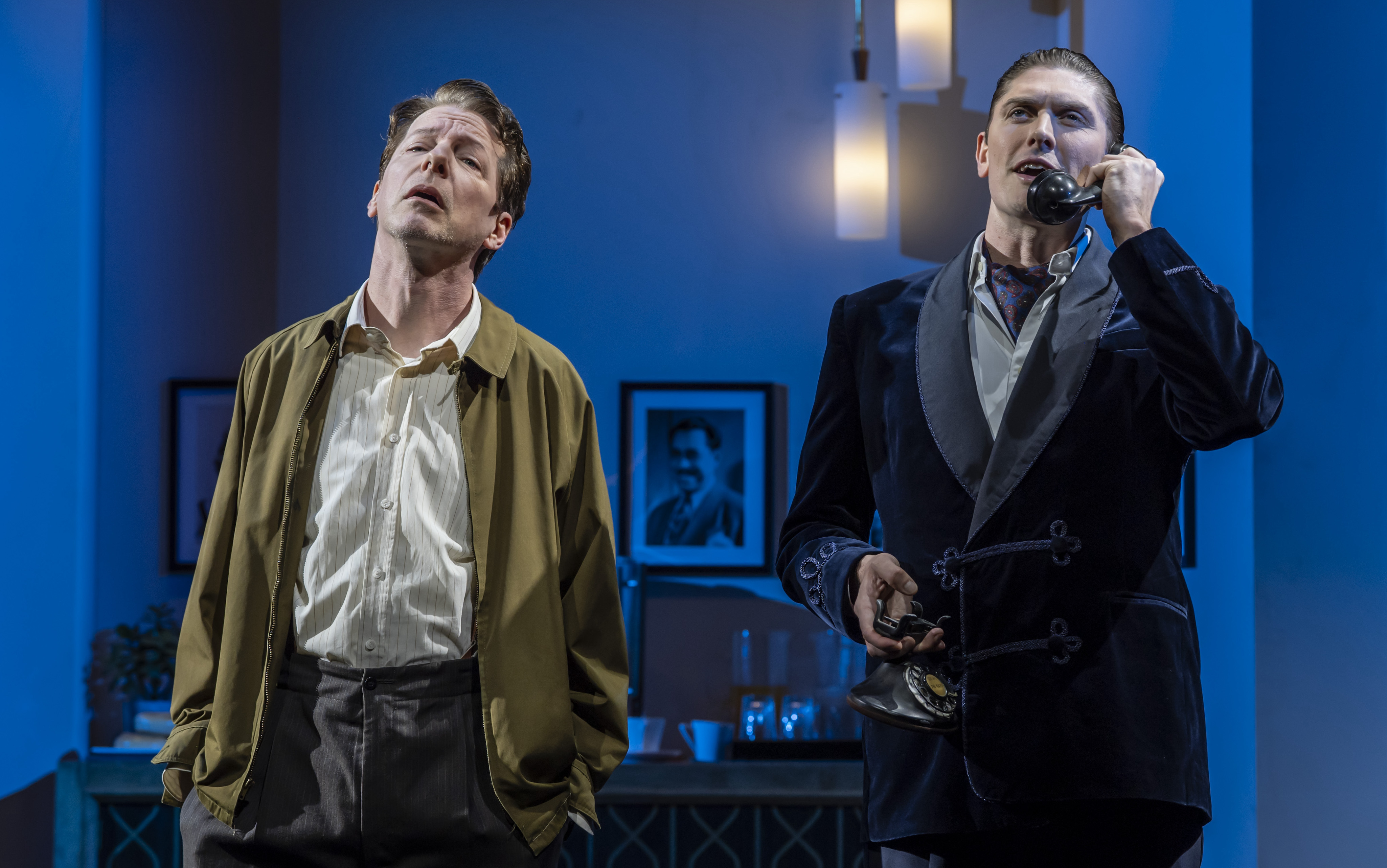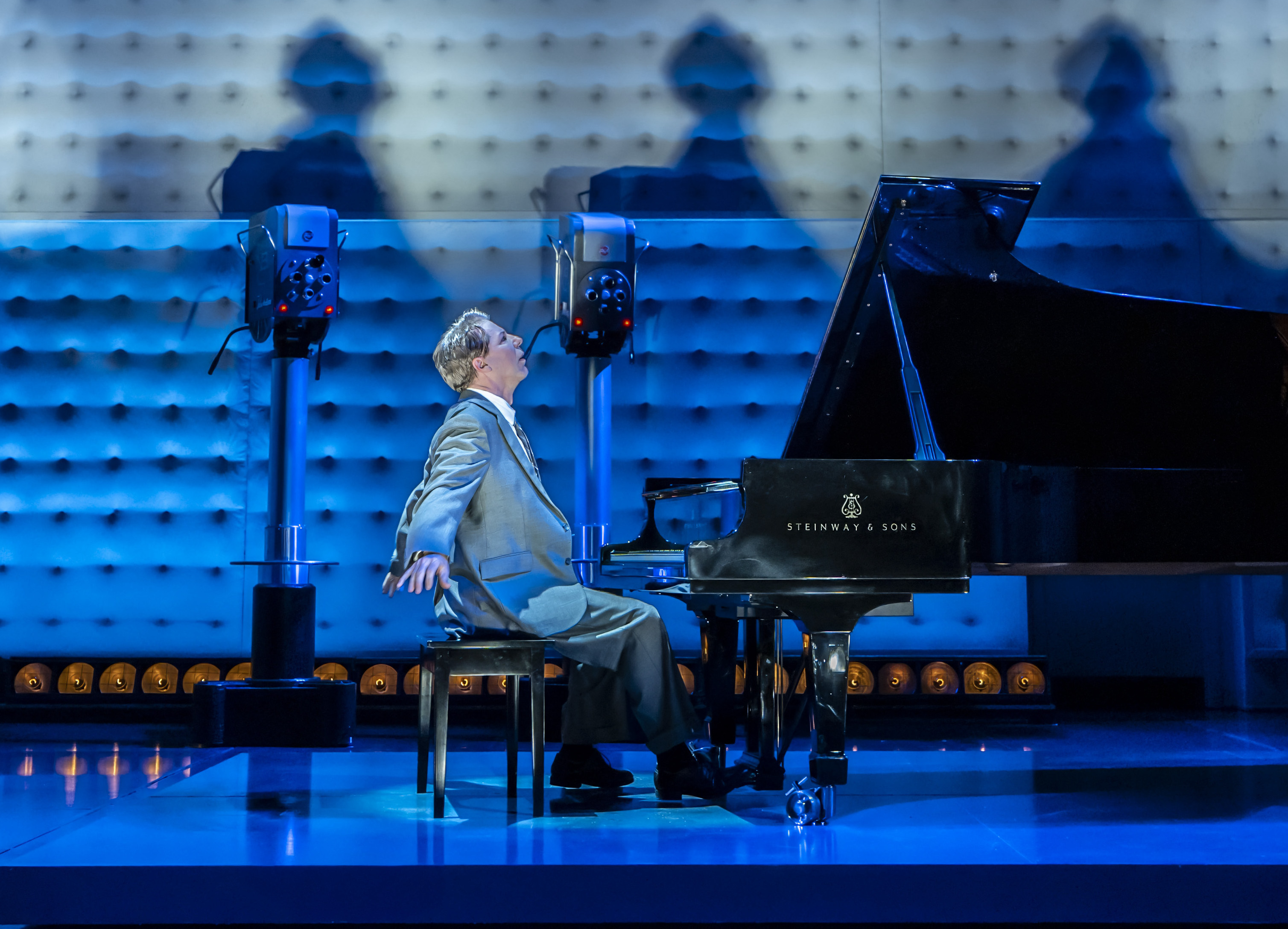Good Night, Oscar, Barbican review - sad story of a Hollywood great's meltdown, with a dazzling turn by Sean Hayes | reviews, news & interviews
Good Night, Oscar, Barbican review - sad story of a Hollywood great's meltdown, with a dazzling turn by Sean Hayes
Good Night, Oscar, Barbican review - sad story of a Hollywood great's meltdown, with a dazzling turn by Sean Hayes
Oscar Levant is an ideal subject to refresh the debate about media freedom

Back in the day, when America’s late-night chat show hosts and their guests sat happily smoking as they shot the breeze for a growing audience, the most sought after guest was Oscar Levant.
No longer a household name except to fans of vintage Hollywood musicals, in some of which, notably An American in Paris, he appeared, Levant (b 1906) was the Swiss Army knife of the entertainment business: a virtuoso pianist, composer, conductor, actor, a writer of hilarious memoirs, a raconteur with his own TV chat show. He was also beset with mental health problems, notably OCD, hypochondria and paranoid schizophrenia, which were exacerbated by his medication, to which he became addicted.
By the time Doug Wright’s award-winning play about Levant catches up with him, in 1958, his long-suffering wife June has felt obliged to have him committed to an institution, where he is undergoing EST and the usual round of drug treatments. But his best friend in television, the chat show host Jack Paar (Ben Rappaport), has persuaded NBC to book Levant for its inaugural edition of The Tonight Show from LA, a surefire ratings winner. A four-hour pass from Mount Sinai hospital has secretly been wangled by June (Rosalie Craig, pictured below) for Oscar to appear on the show, with a trusty orderly, Alvin (Daniel Adeosun), as his chaperone.
 Enter Sean Hayes’s Oscar, first heard kvetching outside the green room’s door, his funny-dial already turned up to 11. Those who have come to see over-the-top gay Jack from Will and Grace will recognise much of Hayes’s Jack in his Oscar. Wright has written for him what amounts to a comedy routine, a relentless stream of one-liners, aperçus and anecdotes, much of it laugh-out-loud funny, which Hayes delivers with impeccable timing and tonal shifts. When, for example, the head of NBC, Bob Sarnoff (Richard Katz), comes to yell at him after the show for his off-colour material, explaining to him what the network believes is unacceptable behaviour in its guests, Hayes makes the line “The network… believes?” a zinger, thanks to that minuscule pause mid-sentence followed by the gentle ridicule he conveys in its last word.
Enter Sean Hayes’s Oscar, first heard kvetching outside the green room’s door, his funny-dial already turned up to 11. Those who have come to see over-the-top gay Jack from Will and Grace will recognise much of Hayes’s Jack in his Oscar. Wright has written for him what amounts to a comedy routine, a relentless stream of one-liners, aperçus and anecdotes, much of it laugh-out-loud funny, which Hayes delivers with impeccable timing and tonal shifts. When, for example, the head of NBC, Bob Sarnoff (Richard Katz), comes to yell at him after the show for his off-colour material, explaining to him what the network believes is unacceptable behaviour in its guests, Hayes makes the line “The network… believes?” a zinger, thanks to that minuscule pause mid-sentence followed by the gentle ridicule he conveys in its last word.
Oscar and Paar are engaged in open warfare with the conservative forces controlling the media – and politics – at the time. They believe television should be a forum for free speech but is being hobbled by double standards, which allow all other kinds of media to operate unpoliced while restricting activities on the small screen. So while Sarnoff sees late-night TV as “warm milk”, Paar uses Oscar’s appearance to get him to tell risqué jokes about J Edgar Hoover’s transvestism and Liz Taylor’s multiple marriages. There’s an especially raunchy one about Marilyn Monroe’s conversion to Judaism.
 Much of Oscar’s humour is directed against himself, though. His self-destructive tendencies are like an open wound. Not just the OCD stirring of his coffee – four times one way, four times the other – but also the toxic memories of his best friend George Gershwin (David Burnett, pictured above right with Hayes), who constantly “talks” to him and whose compositions he allowed to crowd out his own. Levant was the second person to record Rhapsody in Blue, after its composer, a contributing factor in his rise to stardom but clearly a monstrous shackle on his personal creativity. As his four hours of freedom go by, Wright charts Oscar’s meltdown.
Much of Oscar’s humour is directed against himself, though. His self-destructive tendencies are like an open wound. Not just the OCD stirring of his coffee – four times one way, four times the other – but also the toxic memories of his best friend George Gershwin (David Burnett, pictured above right with Hayes), who constantly “talks” to him and whose compositions he allowed to crowd out his own. Levant was the second person to record Rhapsody in Blue, after its composer, a contributing factor in his rise to stardom but clearly a monstrous shackle on his personal creativity. As his four hours of freedom go by, Wright charts Oscar’s meltdown.
Hayes gives an impeccable physical performance, one part or another of his body constantly in motion, a jiggling foot, a rocking upper body. After he downs a bottle of Demerol, he makes his body move in slo-mo, each casual gesture attenuated. His features are unrecognisable as fresh-faced Jack’s, drawn and haggard, like a mournful spaniel’s. He pratfalls and slumps and tumbles.
But what doubtless earned him his Tony award are the seven minutes when he is persuaded to play Rhapsody in Blue on air for Paar's show (pictured below). We are used to actors who can’t play the piano being positioned so the keyboard is hidden and they can mime at will. Not Hayes. He launches into the piece with electrifying gusto, not 100% perfectly in some of the octave runs, but thrillingly enough. Oscar's mental tics are also skilfully incorporated into the recital, such as his paranoid checking of the underneath of the piano or the ceiling during the piece’s pauses. When a recording of the orchestral accompaniment finally joins in, he is positively gleeful, but always totally in synch with the orchestra. It’s a tour de force. This is a handsome production, its sets pinpoint-accurate in projecting the Hollywood luxe of its setting. Tellingly, when the action moves to the sound stage, we see its walls are covered in thick pocketed fabric, insulation that doubles as a padded cell. Lisa Peterson directs a strong cast, all but two of them British, with Rosalie Craig a standout as June, a crisp, smart woman with a supply of trenchant wit of her own (there’s nice wordplay on the double meaning of “commitment”).
This is a handsome production, its sets pinpoint-accurate in projecting the Hollywood luxe of its setting. Tellingly, when the action moves to the sound stage, we see its walls are covered in thick pocketed fabric, insulation that doubles as a padded cell. Lisa Peterson directs a strong cast, all but two of them British, with Rosalie Craig a standout as June, a crisp, smart woman with a supply of trenchant wit of her own (there’s nice wordplay on the double meaning of “commitment”).
This is also a very “American” piece, citing names forgotten or little known here, such as bandleader Xavier Cugat and pioneering chat-show host Steve Allen, not just Levant, or, for that matter, Paar. That’s not a problem, as the play’s core issue of what you can and can’t say in the media is as potent as ever. Even so, Wright has felt obliged to shoehorn in a lot of expositional material about Levant and other luminaries of the time, some of it a tad ham-fisted. And especially when he uses an invented character, Max (Eric Sirakian), an over-excitable studio assistant with a clipboard and an annoying level of fandom, as a human megaphone to relay all this information.
This is a well-oiled machine now, after rave-reviewed runs in Chicago and on Broadway, and its dialogue is delivered with the self-confident ba-boom of an old-style stand-up, its polished gems a little too polished. Hayes has to perform them as Oscar’s instinctive level of caustic wit, rapid-fire retorts from his well stocked arsenal. But they don’t seem quite so spontaneous now. Even so, his is an extraordinary performance, the unmasking of a genuinely sad clown with a great capacity for melancholy and, one hopes, future meaty roles.
The future of Arts Journalism
You can stop theartsdesk.com closing!
We urgently need financing to survive. Our fundraising drive has thus far raised £49,000 but we need to reach £100,000 or we will be forced to close. Please contribute here: https://gofund.me/c3f6033d
And if you can forward this information to anyone who might assist, we’d be grateful.

Subscribe to theartsdesk.com
Thank you for continuing to read our work on theartsdesk.com. For unlimited access to every article in its entirety, including our archive of more than 15,000 pieces, we're asking for £5 per month or £40 per year. We feel it's a very good deal, and hope you do too.
To take a subscription now simply click here.
And if you're looking for that extra gift for a friend or family member, why not treat them to a theartsdesk.com gift subscription?
more Theatre
 The Weir, Harold Pinter Theatre review - evasive fantasy, bleak truth and possible community
Three outstanding performances in Conor McPherson’s atmospheric five-hander
The Weir, Harold Pinter Theatre review - evasive fantasy, bleak truth and possible community
Three outstanding performances in Conor McPherson’s atmospheric five-hander
 Dracula, Lyric Hammersmith review - hit-and-miss recasting of the familiar story as feminist diatribe
Morgan Lloyd Malcolm's version puts Mina Harkness centre-stage
Dracula, Lyric Hammersmith review - hit-and-miss recasting of the familiar story as feminist diatribe
Morgan Lloyd Malcolm's version puts Mina Harkness centre-stage
 The Code, Southwark Playhouse Elephant review - superbly cast, resonant play about the price of fame in Hollywood
Tracie Bennett is outstanding as a ribald, riotous Tallulah Bankhead
The Code, Southwark Playhouse Elephant review - superbly cast, resonant play about the price of fame in Hollywood
Tracie Bennett is outstanding as a ribald, riotous Tallulah Bankhead
 Reunion, Kiln Theatre review - a stormy night in every sense
Beautifully acted, but desperately grim drama
Reunion, Kiln Theatre review - a stormy night in every sense
Beautifully acted, but desperately grim drama
 The Lady from the Sea, Bridge Theatre review - flashes of brilliance
Simon Stone refashions Ibsen in his own high-octane image
The Lady from the Sea, Bridge Theatre review - flashes of brilliance
Simon Stone refashions Ibsen in his own high-octane image
 Romans: A Novel, Almeida Theatre review - a uniquely extraordinary work
Alice Birch’s wildly epic family drama is both mind-blowing and exasperating
Romans: A Novel, Almeida Theatre review - a uniquely extraordinary work
Alice Birch’s wildly epic family drama is both mind-blowing and exasperating
 The Producers, Garrick Theatre review - Ve haf vays of making you laugh
You probably know what's coming, but it's such great fun!
The Producers, Garrick Theatre review - Ve haf vays of making you laugh
You probably know what's coming, but it's such great fun!
 Not Your Superwoman, Bush Theatre review - powerful tribute to the plight and perseverance of Black women
Golda Rosheuvel and Letitia Wright excel in a super new play
Not Your Superwoman, Bush Theatre review - powerful tribute to the plight and perseverance of Black women
Golda Rosheuvel and Letitia Wright excel in a super new play
 Cow | Deer, Royal Court review - paradox-rich account of non-human life
Experimental work about nature led by Katie Mitchell is both extraordinary and banal
Cow | Deer, Royal Court review - paradox-rich account of non-human life
Experimental work about nature led by Katie Mitchell is both extraordinary and banal
 Deaf Republic, Royal Court review - beautiful images, shame about the words
Staging of Ukrainian-American Ilya Kaminsky’s anti-war poems is too meta-theatrical
Deaf Republic, Royal Court review - beautiful images, shame about the words
Staging of Ukrainian-American Ilya Kaminsky’s anti-war poems is too meta-theatrical
 Laura Benanti: Nobody Cares, Underbelly Boulevard Soho review - Tony winner makes charming, cheeky London debut
Broadway's acclaimed Cinderella, Louise, and Amalia reaches Soho for a welcome one-night stand
Laura Benanti: Nobody Cares, Underbelly Boulevard Soho review - Tony winner makes charming, cheeky London debut
Broadway's acclaimed Cinderella, Louise, and Amalia reaches Soho for a welcome one-night stand
 The Pitchfork Disney, King's Head Theatre review - blazing with dark energy
Thrilling revival of Philip Ridley’s cult classic confirms its legendary status
The Pitchfork Disney, King's Head Theatre review - blazing with dark energy
Thrilling revival of Philip Ridley’s cult classic confirms its legendary status

Add comment